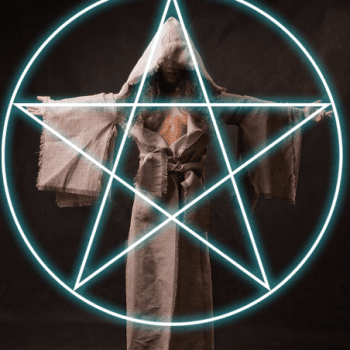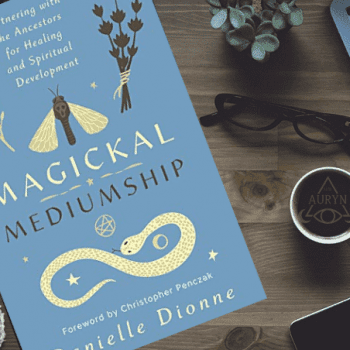About a year a go at the Temple of Witchcraft I approached Christopher Penczak because I noticed a shape and color in his aura that I never saw before in anyone. I approached him and described what I was seeing and asked him about it. He told me that based upon what I was seeing that it was most likely due to to the heavy protection work he had done earlier in the day and the fact that he was working with healer’s gold because he had visited a prison that day for Capricorn Ministry.
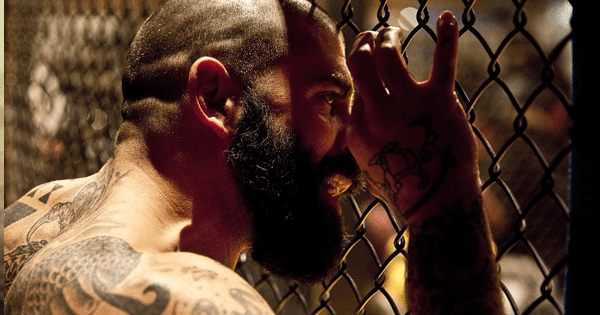
Suddenly I had this realization that there’s Pagans in prison and that just like other religions Paganism offered services and support for them. I guess it had never dawned on me before because they’re incarcerated and hidden from the public eye. Later down the road I noticed the same shape and color in his aura again and asked him if he had been to the prison that day, he gave that big Christopher trademark grin and said “I did, actually. How did you know?” So I relayed that I was seeing the same thing in his aura.
It’s gotten to the point to where I can pretty much tell anytime he’s gone to do prison ministry work. In fact it became sort of a personal psychic game for me. Each time it’s caused me to think about the concept of Pagans in prison and the interactions that take place more and more. We as a society have a tendency to hold prejudices against people in prison. While some are violent offenders, a large portion of them are not in there for that reason. I’m a strong believer that people make mistakes and that people can change. I have seen this first hand with people who have been incarcerated in prison. I wondered how this impacted the inmates and I also wondered how these services might affect the ministers.
I definitely wanted to know more. So I decided to reach out to three Pagans who work with inmates and ask them some questions. I reached out to Christopher Penczak who is in my local community at the Temple of Witchcraft, Leslie Hugo who is in my broader community at the Temple of Witchcraft and Donna Donovan who is outside of my Pagan community.
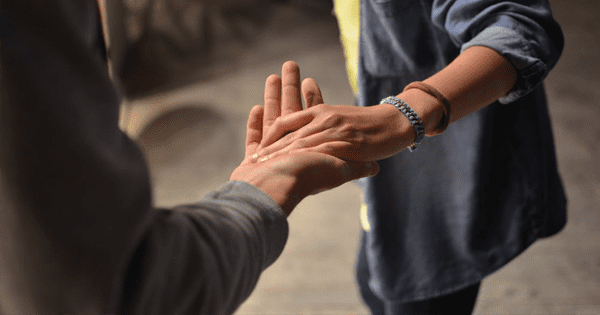
Reverend Donna Donovan works with Pagan inmates through Appalachian Pagan Ministry which is currently within 10 facilities (including Death Row) in 2 states, West Virginia and Ohio. She and the Appalachian Pagan Ministry goes in monthly and hold Moots with the Heathen inmates, services with the Wiccan and general pagan inmates, services with the Satanist and Luciferian inmates, as well as offering several correspondence courses to Kindreds and Covens in facilities around the nation. Appalachian Pagan Ministry also facilitates various rituals on site for the facilities they serve in person, holds memorials for those inmates who have passed, and helps with resources and such upon release.
High Priest Christopher Penczak is the co-founder of the Temple of Witchcraft and volunteers in the Temple’s Capricorn Ministry in New Hampshire. Part of the Capricorn Ministry’s responsibilities include supporting those of an overall Pagan religion who are currently incarcerated in the United States penal system. Support includes outreach, social correspondence, education and personal/religious resources as dictated by each individual case. He visits New Hampshire State Prisons to perform Sabbats and Religious Education. He currently serves at the Berlin New Hampshire State Prison and has also worked in the Concord New Hampshire State Prison.
High Priestess Leslie Hugo is the lead Capricorn Minister of the Temple of Witchcraft. As the Volunteer Pagan Minister for the Utah Department of Corrections, she works with over to 200 inmates in five facilities who identify as Wiccan, Asatru or Pagan. She provides spiritual counseling, teaches Reiki and Wicca classes and leads ritual on the Sabbats. Since starting this work in early 2014, Leslie developed a passion for prison ministry and prison advocacy. She strongly believes that inmates who develop strong spiritual practices while in prison have a much higher chance of successfully reintegrating back into society when are released.
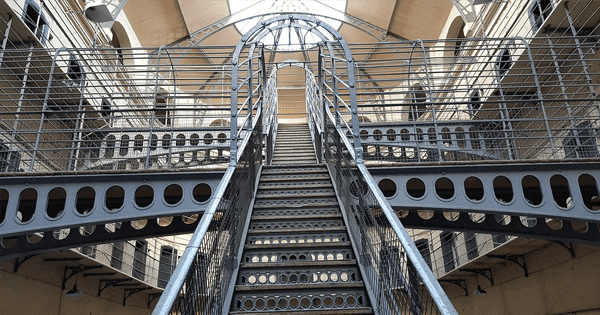
What inspired or motivated you to work with Pagan inmates?
Donna Donovan: I, myself, was once incarcerated, and had no access to anything regarding my own spiritual path. I have also had various loved ones in the same position. When I founded this Ministry and asked what I should do with it…I was told to “go to prison”. I have learned over the years to listen when my deities and ancestors speak.
Christopher Penczak: I honestly didn’t have any plans to work in the prison system with inmates. As an author starting before the days of social media, much of our “fan” mail was through pen and paper letters via our publishers. I got a lot of prison mail and for a long time tried to answer each and every letter, including prison letters. After a while, most readers contacted me through my website or then social media, and the only written letters were from prisons. Before we officially started the Temple of Witchcraft, two students offered to start a prison correspondence pen pal program, since it was very difficult to answer all the letters myself. When the Temple began, their work got folded into the umbrella of the non-profit, under Capricorn ministry. Capricorn deals with Men’s Mysteries, restriction and time, and prison work seemed to fit under its Saturnine influence.
When one of the volunteers was asked to go into the prisons personally, agreed and then decided not to go, I felt honor bound that the Temple accepted the invite and I couldn’t ask anyone else to do it if I wasn’t able to do it myself. So I bit the bullet and went for Imbolc in Berlin State Prison, about six years ago.
Leslie Hugo: At the time I started, the Temple of Witchcraft was getting a lot mail from inmates in Utah, something like 30 letters a month. Since there was a definite need for a pagan minister in Utah, I thought I would give it a try! I remember how nervous I was the first day. It was Beltane, 2014. The inmates were so respectful and appreciative that I was there to lead ritual and teach, I was put at ease almost immediately. Since then, I have worked with over 200 pagan inmates in 6 different facilities in Utah.
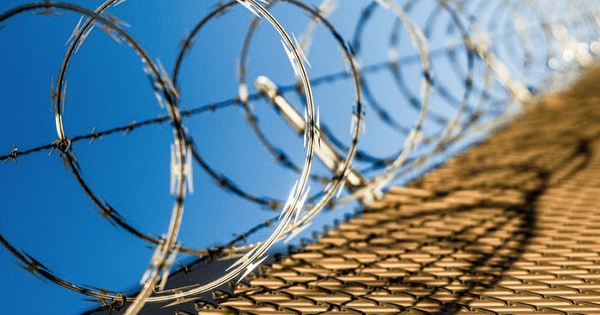
What were some misconceptions you had before you began?
Donna Donovan: I went in to this situation very “eyes wide open”. Aside from my own incarceration, I since worked with forensic inmates in State employment.
Christopher Penczak: I was really stunned at the mix of deep education with little practical skills. My first few sessions involved deep philosophical questions that showed a group of men really well read on a number of esoteric subjects. It went way beyond the Wicca 101 yet despite having the time to practice, not a lot of experience putting their knowledge to use in meditation, energy work or simple ceremony
Leslie Hugo: I think the biggest misconception I had was that most people in prison are “dangerous”. It turns out that over 80,000 people in the US are in prison for drug offenses. That’s almost 50% of the total number of all incarcerated individuals. Since the “war on drugs” was instituted in the 1980’s, the US has incarcerated a higher percentage of its population than any other country in the world. These people need rehabilitation and support, not long prison terms. Tens of thousands more are in for immigration or fraud offenses. I rarely work with inmates who are in for serious offenses or who are actually deemed “dangerous”, since they are housed in a different facility.
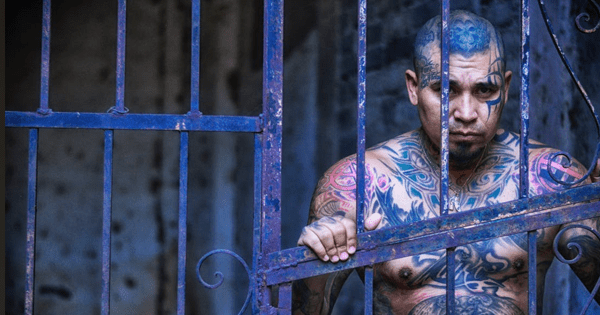
What are misconceptions that you think the general pagan community has in regards to Pagan inmates?
Donna Donovan: That “it’s a waste of time”, these inmates are “dishonorable”, or the even bigger one…”This doesn’t affect me.” Well, it DOES affect you. 95% of those incarcerated WILL BE released. They will be in your community, at your festivals and drum circles, at your jobs, etc.. It behooves us to help these folks come out of prison better then when they went in. Are they dishonorable? Well, when they committed their crimes, the majority definitely were, and they will tell you that. However, many come to their chosen paths during their time of incarceration. You’ve heard the phrase “They found Jesus in jail”? It’s no different from those of a pagan path. They have now made a conscious decision to live their lives in practice of their faith, honorably.
Christopher Penczak: Very few realize that there are pagans in prison, or there is a need for Pagan ministry. Many also think “why bother” but if we are all intimately connected in the body of the Earth Goddess and Star Goddess, then we all matter.
Leslie Hugo: Honestly, it’s hard to say.
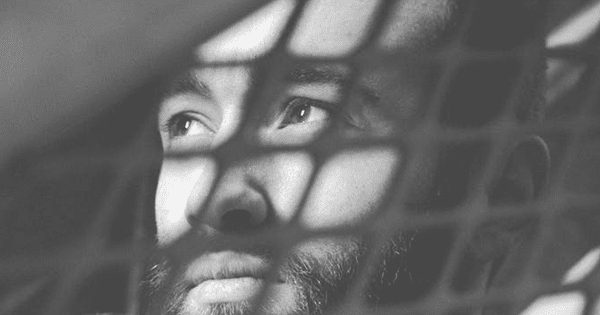
How have you seen this work impact inmates?
Donna Donovan: We held a Blot for Yule at all of the facilities. At the end, we did a 3 round Sumble. The last round was to what they wanted to accomplish in the coming year. Almost across the board, at all facilities, the answer was “to grow in body, mind, and spirit. To leave prison a better person. To live in a way that honors the Gods, the Ancestors, and the family” I have seen various groups…Wiccans, Odinists, Satanists…come together in one room (where this is almost unheard of) and work together with NO incidents.
Christopher Penczak: I’ve seen some really aggressive and awkward men really take a turn towards gentleness and honesty in group. Everyone comes in with a mask, with a shield, and while they are still on the defensive being in prison, I’ve seen a lot of their guard come down and be honest and open and sharing after rituals and meditations. Over the years, I’ve seen men work towards release, and say that if they didn’t have their magickal practices, they wouldn’t be as far as they are.
One gentleman in particularly really bothered me. For a few years we had a “nice” and peaceful group of inmates identify mostly as some form of Pagan. He came from a higher security group, and acted like the “leader” of a number of higher security group men who all identified as Odinists, and for many, that was clearly code for some form of unclear Neo-Nazi belief. While not speaking to me directly, he made a homophobic statement about another inmate and it really upset me. I was also quite shocked, as I had been there years without anything like that.
The next time I went in, I spoke to the group, without saying anything to anyone directly, but about how certain language was and wasn’t acceptable, and if it is unacceptable again I won’t be returning. We get outside for circle, and he says another homophobic remark, not to me, but again in general. I forgot where I was and I started yelling at him like i would outside of the prison to someone in circle and he was stunned and apologetic and I realized, he didn’t even consider what he was saying as homophobic. He spent the next three hours trying to re-establish some sort of rapport and I was not having it. By the end, I was impressed enough with his perseverance and accepted his apology. Since then, he’s opened up his belief system quite a bit and showed levels of sensitivity to me, and to the group, that honestly have shocked me based on my first few experiences with him.
Leslie Hugo: The biggest change I’ve seen is the ability for some inmates to be better able to cope with the stress of living in prison. Techniques like meditation and shielding help them maintain a sense of peace, and to some extent ignore other inmates trying to pick fights.
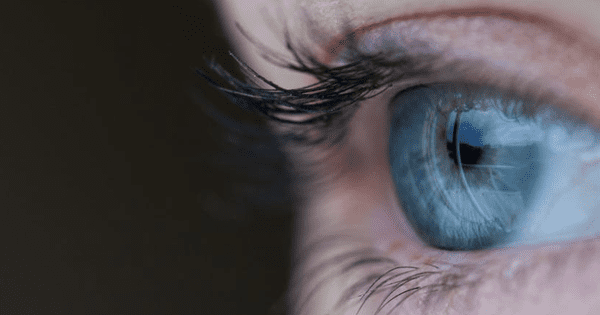
How has this work impacted you? How has it touched or changed you?
Donna Donovan: I have learned more about myself and my own personal beliefs from doing this work. I have seen despair, humility, joy and compassion on the same day, in a way that I can not explain. My son passed away in Nov 2015…on Mother’s Day this year, I received several messages from inmates expressing their concern and giving me inspirational messages. I have now seen first hand, the injustice of our legal system, the discrimination towards those of non-Abrahamic paths, and the inner strength of those enduring this and fighting to make it better for those who come later.
Christopher Penczak: For me, despite being very liberal in many ways, I was very cut and dry about crime and punishment, and actually a believer in capitol punishment, but since doing prison ministry, and seeing the change in so many men, and hearing so many stories, I realize that things are not as clear as we’d like to believe. Don’t get me wrong, most if not all I deal with are criminals, but I see such opportunities for change and growth.
The gentleman who scared me the most on my first few visits, the big biker who alluded to deep violence, soon became my favorite, and is in process now of being released. When the general pagan group was filling with those who might be using Paganism as a cover for white supremacist beliefs, he was the first to speak up in group to them, as someone who was formally in that vein, but now was open to Yoga, Taoism and Qabalah. While its an exhausting ministry, and the prison is three hours away from me, I wouldn’t have kept up with it for six years if it wasn’t so rewarding. Every time they surprise me with something new – a new insight, a new discovery a new change in their lives.
Leslie Hugo: I can honestly say that this is the most rewarding volunteer work I have ever done. It has helped me to be more compassionate and non-judgmental of people in general.
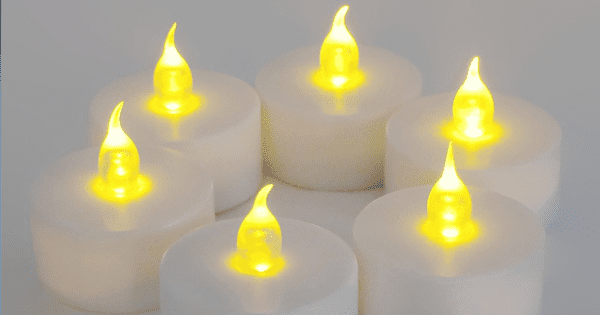
What restrictions or limitations are there for working with inmates vs working with the public? Obviously you can’t bring an athame into the prisons and such, so how is this worked around these restrictions?
Donna Donovan: There are the obvious restrictions like that…but the biggest restriction and limitation to inmates is access to information. They can not just jump on the internet and Google something. They need learning resources…books, magazines, etc… How do we work around the restrictions? Be very imaginative. I made a Mjolnir (Thor’s hammer) from cardboard, aluminum foil and paint to use for the Yule Blot. We use LED candles to represent flame for fires. My ladies at Lakin Correctional made their “fire” from paper towel rolls and colored paper. You do what you can do.
Christopher Penczak: With the exception of blades and nothing in glass, we’ve enjoyed a full compliment of traditional and non traditional tools – cauldron, incense, oils, wand, stang, goat skull, goddess and god statues – all used outside at a fire pit. We make offerings of grains and herbs. Apple mix drink rather than wine or mead, and little dixie cups instead of a big chalice, but overall really not a lot of restriction. You just have to go through the process of getting everything approved.
We try to do a lot of meditation and energy work, things they can do alone in their rooms. I make it a part of every ritual, and give them “homework” to follow up between visits.
Leslie Hugo: I have a very small list of items I am approved to bring into the prison, including a battery operated tea light for the altar, and a small drum. There are a lot of restrictions so creativity is key! I print a lot of things out on paper, images that are symbolic for the 4 quarters, gods and goddesses. I try to theme my images as I would if I was creating an altar with the actual items. I encourage the inmates I work with to use their imagination, and to be creative when they do solitary ritual in their cells, to either draw pictures of things they want to focus on, or use their “Inner Temple” to work with sacred items. I emphasize meditation practice as a way to get in touch and deepen relationships with personal gods and goddesses.
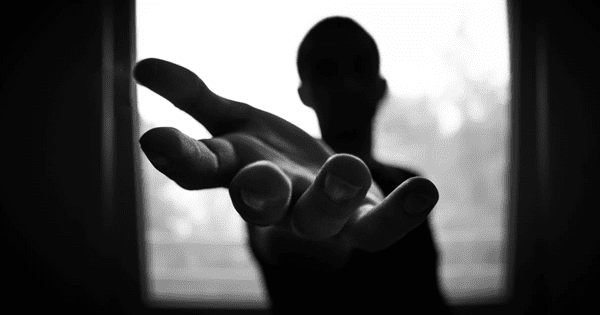
How can we as a public support inmates as individuals who want to get involved and how can we help support your organization working with inmates?
Donna Donovan: Funding, funding, funding!! I can not express this enough. Many groups that do what we do, do it entirely out of pocket. The costs add up quickly. From fuel, hotel rooms, food to printing costs, postage, paper and ink. Donate materials….books especially. Heathen books most!! Poetic and Prose Eddas, etc. Volunteer your time. I understand that going behind the walls is not for everyone, but if you can…then do. To help Appalachian Pagan Ministry, we have a page on our website that explains what you can do.
Christopher Penczak: Many organizations have pen pal programs. That is a great place to start. Seeing if there is a need for pagan ministry at your local prison is also a good thing, especially if you are a minister, though you don’t have to be ordained to be a public volunteer. Many prisons don’t allow services if a volunteer is not present from the outside, so that is one of the reasons why it is important.
Leslie Hugo: I want to preface this answer by stating that over 90% of all incarcerated individuals will be released from prison. Many inmates are themselves victims of some type of trauma or abuse and need counseling and support (over 90% of incarcerated females have been victims). Over 50% of incarcerated individuals have a sentence of 5-15 years. Most of the inmates I work with state that the biggest thing they need when they are released is support. The more support they have from their communities, the better their chances of not repeating offenses. Having a “spiritual family” plays a big part in this support. Also, many pagan inmates have a lack of support from their Christian families with regard to their spiritual path they have chosen to follow.
If any pagan groups or covens are interested in having their group listed as a resource for pagan inmates being released from prison in their area, please write to Capricorn@templeofwitchcraft.org. People can also let us know if they are interested in becoming a pen pal to a pagan inmate by sending an email to that address.
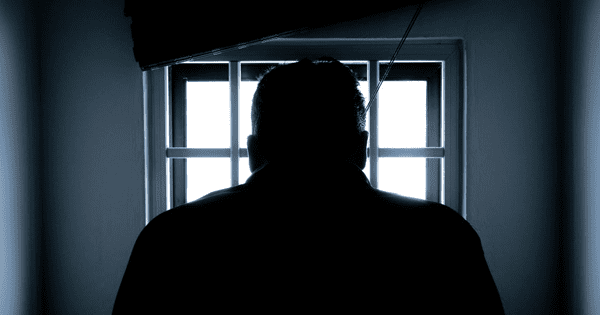
Have you faced any discrimination while doing this work? Do the pagans inmates face religious discrimination?
Donna Donovan: I have actually faced more discrimination, believe it or not, from the pagan community. Especially in the Heathen community. As for inside the prison system, as this program has grown and numbers of attendees are rising, yes. There is a fear based stigma from Administration…not entirely unfounded if we look at history. However, it is in doing these programs that we are able to break that stigma.
Christopher Penczak: While my main contacts at the prison are wonderfully supportive of my work, and in fact, inviting the Temple of Witchcraft to come in to offer services, we’ve had a few issues with other staff. One tried to deny pagan inmates their library books for the week, since our service coincided with library service in the higher end security section. A polite letter to management rectified the situation, but in my opinion there was some tension there.
Some of the other inmates look at us all funny when going outside for circle. Granted I’ve gotten permission from the prison systems to have a stang and a goat skull, so it’s out of the ordinary. On the whole I’ve found other inmates who are not Pagan respectful for the most part, as have the staff and security. Some of the inmates report feeling persecuted by the administration for being Pagan, but sometimes they are also asking for a lot more than what other inmates get, because our religion has more “stuff” associated with it.
Leslie Hugo: While I have not personally experienced any discrimination, many of the inmates I work with tell me stories of how other Christian inmates call them Satanists and harass them. There is also a lot of discrimination by the guards, who regularly confiscate approved sacred items like pentacles, or go through inmates personal Books of Shadows, when they do not do the same thing for the sacred items belonging to Christian inmates.
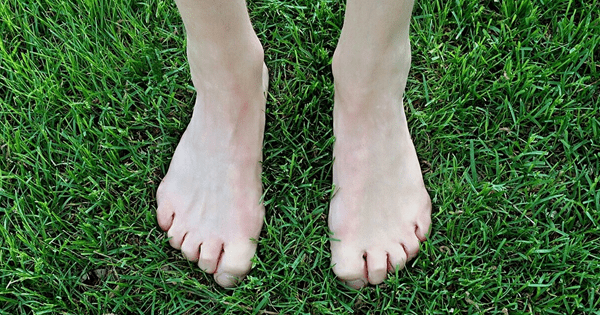
Any other thoughts, stories or memories that you want to share? Anything else you want to say on the subject?
Donna Donovan: I appreciate any talk and information going out about our fellow pagans currently incarcerated. Incarceration is a dehumanizing experience…it is designed to be. Keeping that connection with the community by volunteers coming in is crucial in keeping the humanity. When a person is locked away like an animal, and treated as such, why is anyone surprised they come out acting like one? If they are given the opportunity to learn from what they did, grow in body, mind and spirit, and have a connection to the community they will be released back out into….then they are less inclined to re-offend.
Christopher Penczak: One of my favorites is when we first got permission to do ritual outside with a fire. They asked if they could take off their shoes and the chaplain agreed for religious purposes. I had to throw out the ritual I wrote because I soon realized many of the men had not had their bare feet on the grass in years, and the ritual turned into a whole earth/grass/grounding connection ritual because that was what was profound in the moment, not anything I could guide them through. The idea of not being able to have your feet bare on the ground for years just blew me away, and I had greater appreciation for their situation than ever before.
Leslie Hugo: I’ve attached a sermon that I gave at my local UU church on the topic:
“It turns out that this service was scheduled at a very timely period for me. I just returned home on Friday from a Lobby Day in Washington DC, where I was able to meet with both our Senators and Representatives from Utah on prison sentencing reform.
But the story of how I became passionately involved in this issue really starts 2 years ago, while I was at a conference in New Hampshire and overheard a conversation across the lunch table from me, where one woman was telling another conference attendee that she really needed help in Utah. At that point, I joined in the conversation and asked her what she needed help with, because I lived in Utah.
She said that she ran a prison pen pal program, and that she received the most mail from Utah, and that people had been writing, asking for spiritual help. She asked me if I was interested in going to the prison to help minister to these people. Slightly horrified, I said I would “look into it” when I returned to Utah but I wasn’t making any promises.
About a month later, after making some phone calls, I attended the volunteer training at the prison, and the following week, showed up on a Saturday morning to lead a sunrise service. I remember being so terrified that first day, not knowing what to expect, or how I would be treated.
After almost two years of ministering at the prison in Draper every Saturday morning, I’m still surprised at how quickly I came to love this work and the deep compassion I feel for the inmates there.
To give you some quick statistics, close to 95% of all inmates will eventually be released from prison. On an average nationally, over 50% of crimes are drug related. In addition to that, most people in prison have been victims at some point in their lives. For the women in prison, that statistic is over 90%.
All of the people in prison have been part of a family, a neighborhood, a community before they committed their crime. So what exactly does this mean when we put all this together?
Perhaps it is best if I give you some scenarios to visualize. A young mother is regularly beaten by her abusive husband. She turns to meth to escape the pain and reality of life. During one drug purchase, she happens to be in the wrong place at the wrong time, and gets caught up in a drug bust and ends up in prison.
A 20 year old man gets caught having consensual sex with his 17 year old girlfriend. While this is sometimes considered a “Romeo and Juliet case” and might be dismissed, because they were smoking marijuana and he had the drugs in his possession, he is put in prison for a minimum of 10-15 years and will carry the title of “sex offender” with him.
A young teen, after leaving home and a dysfunctional family, gets caught up in a local gang, and is forced to sell drugs to make money for the local gang leader. He gets caught and ends up in prison.
A woman in her 40s, after caring for and losing both parents to long suffering illnesses, turns to alcohol to escape her pain and depression. After already receiving one DUI, she drinks too much again on her way home from work, totals her car, destroying other property with it, and ends up in jail for reckless driving and endangerment and another DUI, as well as being put on suicide watch.
How would you feel if one of these people was your husband, your sister, your son, your neighbor? Someone you knew, respected, but made a mistake along the way.
While I am not condoning any of the actions of these individuals, I do have immense compassion for them, and for what they have suffered. I have dozens of more examples I could share with you. Every one of these individuals has emotional wounds that need healing. I’ve worked with over 200 individuals in the past two years, heard their stories of pain and sorrow, heard their dreams for a better future, of how they want to get an education, find a job that they love, find someone to marry and raise a family with, or be released to the wife, children, parents, who they left behind when they were incarcerated. Many have not had the opportunity to say goodbye to loved ones who have passed away while they were in prison, to parents, siblings, and in some cases, a child. In my experience, what most of these individuals need is counseling, rehabilitation, education and a second chance at life.A lot HAS been done for prison reform, both nationally and on a state level. Here in Utah, we recently passed HB 348 that put a number of changes in place, including a transition team that will help individuals find jobs and housing when they are released, as well as revising parole rules. In addition, we have an opportunity to change the quality of life that incarcerated individuals have when the new prison is built in Salt Lake, including better services and educational programs.
There is still much work to be done. If you are interested in finding out what some of these opportunities are, please join us in the social hall after service for a discussion. Anna Brower from the ACLU will be here to lead our discussion and tell you a little more about what is happening here in Utah.”














